United Conservatives poised for victory in a very close Alberta election: Abacus Data Poll
Analyzing the final poll of an election is both an exciting and anxiety-inducing exercise, especially when the election is close.
Throughout the pre-campaign and campaign periods in Alberta, I’ve tried to offer a deeper understanding of what’s going on in the province, starting with our first survey back in December. That survey suggested that Danielle Smith and the UCP could be in trouble because of a group within the electorate that I termed “Reluctant UCPers”.
I’m going to approach this report slightly differently than others we have done throughout the campaign.
I’m going to offer up the reasons why I think the UCP are the favourites to win tomorrow and help explain how we got here and the underlying reasons why the NDP is likely to fall short of winning the election yet still achieve a remarkable feat – winning close to a majority of the vote in Alberta.
As I did in our previous analysis, I’ll focus on those who have already voted or are likely to vote.
Our Final Forecast: Despite a very close province-wide vote (UCP 49%, NDP 48%), the UCP should win tomorrow.
Based on our survey of 1,200 eligible voters in Alberta, conducted from Friday, May 26 to Sunday, May 28, 2023, I believe the UCP and Danielle Smith are well-positioned to win tomorrow although it is close enough that I could be wrong.
Province-wide, I expect the UCP to get close to 49% of the vote. The NDP will get around 48% with other parties collecting about 3%. This estimate is based on the responses of Albertans who have already voted and are likely to vote tomorrow.
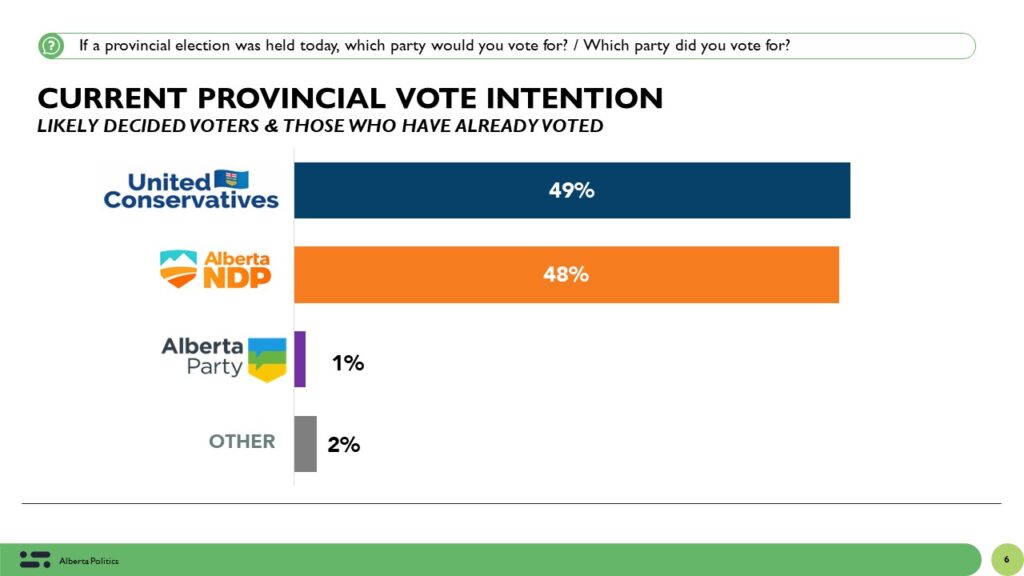
Here is a bit more detail about how the vote breaks down:
According to our survey, 27% of eligible voters in Alberta said they had already voted in advance polls. 50% said they voted UCP while 47% voted NDP. 1% voted for the Alberta Party and 3% voted for other parties.
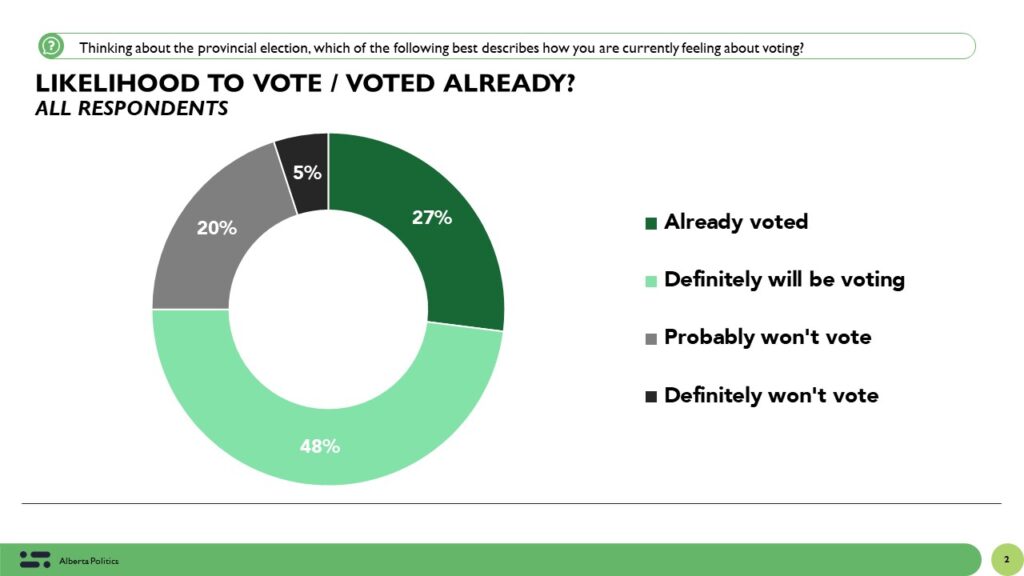
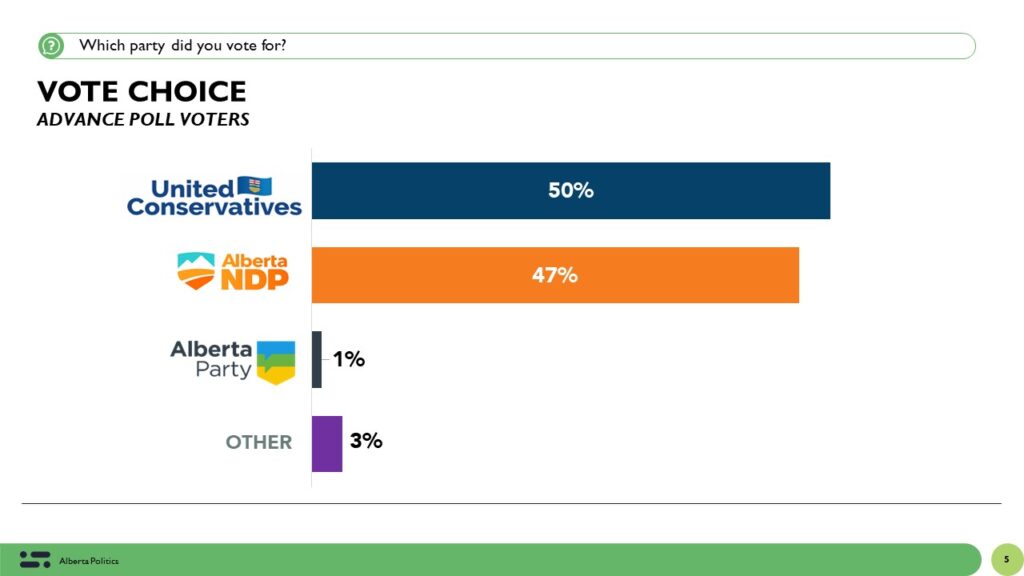
Among all eligible voters, the UCP leads by 4 over the NDP. Since mid-May, the UCP vote is up 9 points while the NDP vote is down 3. 12% of all eligible voters remain undecided, a drop of 7-points since our survey last week.
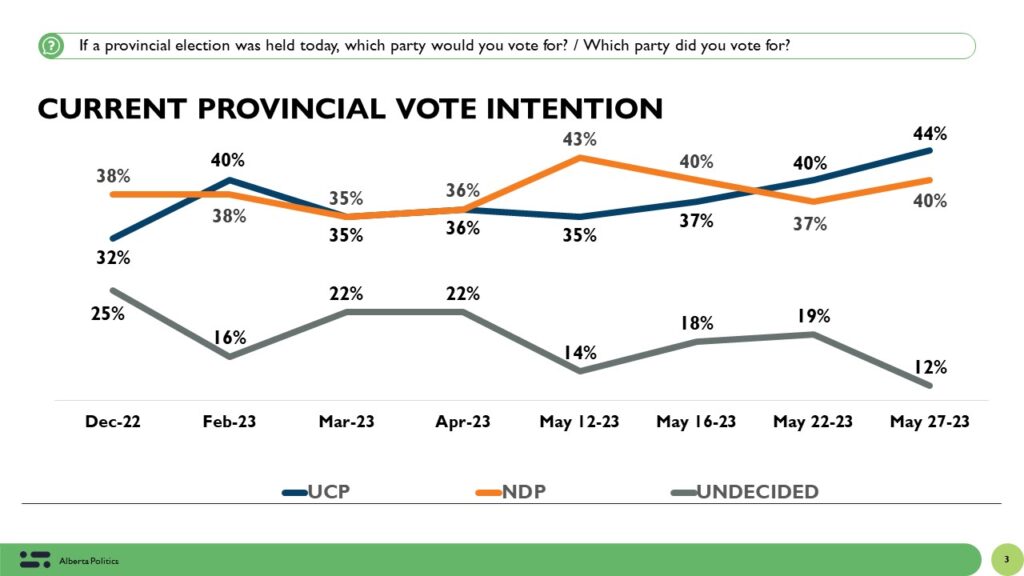
The UCP leads by 21 among those 45 and over while the NDP leads 61% to 36% among those under 45.
The UCP leads by 19 among men while the NDP leads by 15 among women.
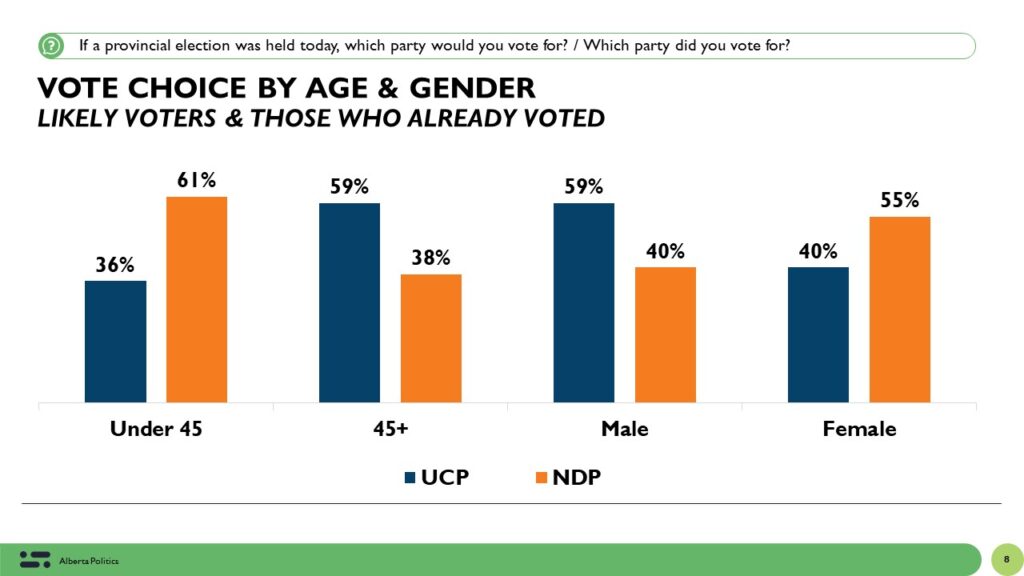
The NDP is ahead by 30 in Edmonton proper (60% to 30%) while the UCP is well ahead outside of the two largest cities (UCP 57% vs. NDP 40%). In Calgary proper, we have the UCP ahead by 9 (54% to 45%). Given the sample sizes in each region, there’s almost a 100% chance that each party’s lead in each region is statistically significant. The margin however could vary. In Calgary for example, the NDP could be ahead by 1 point while the UCP could be ahead by 19. But the likelihood of such a large lead for the UCP or a slight lead for the NDP is rather small.
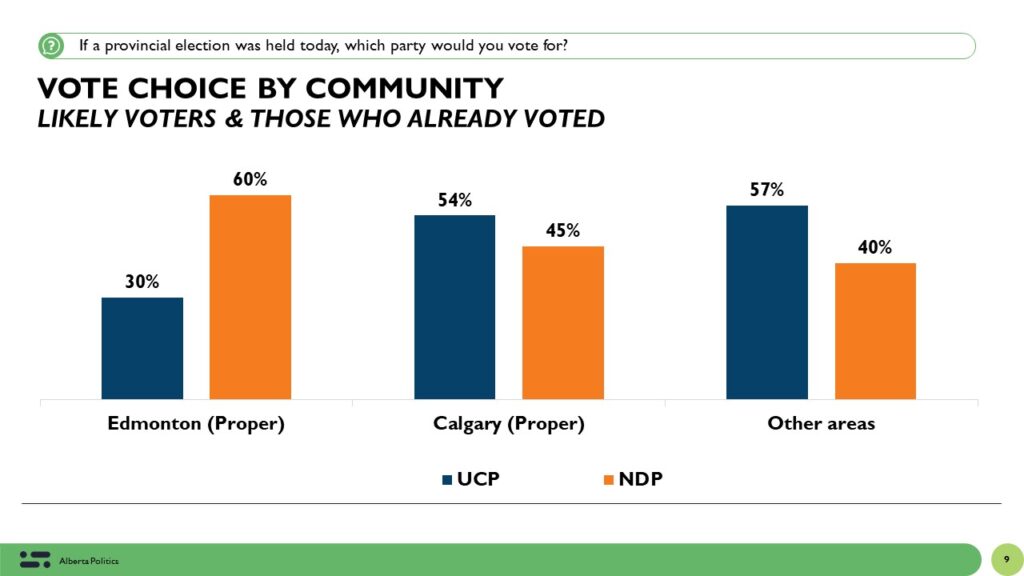
The UCP and NDP are tied among those with high school or less, the UCP is ahead among those with a college degree or some university, while the NDP is well ahead among those with a university degree.
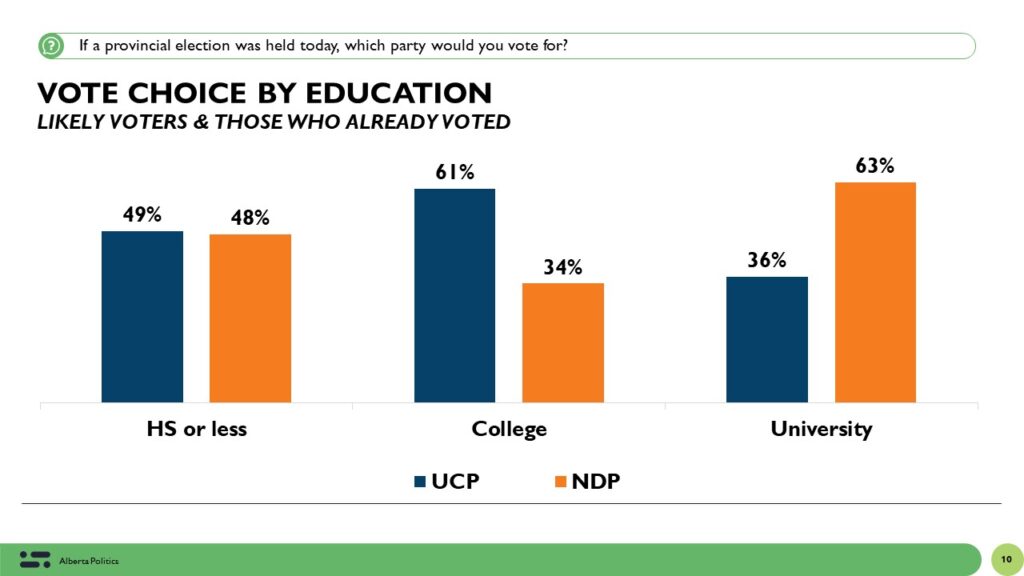
The UCP leads by 11 among non-racialized Albertans while the NDP leads by 31 among racialized Albertans.
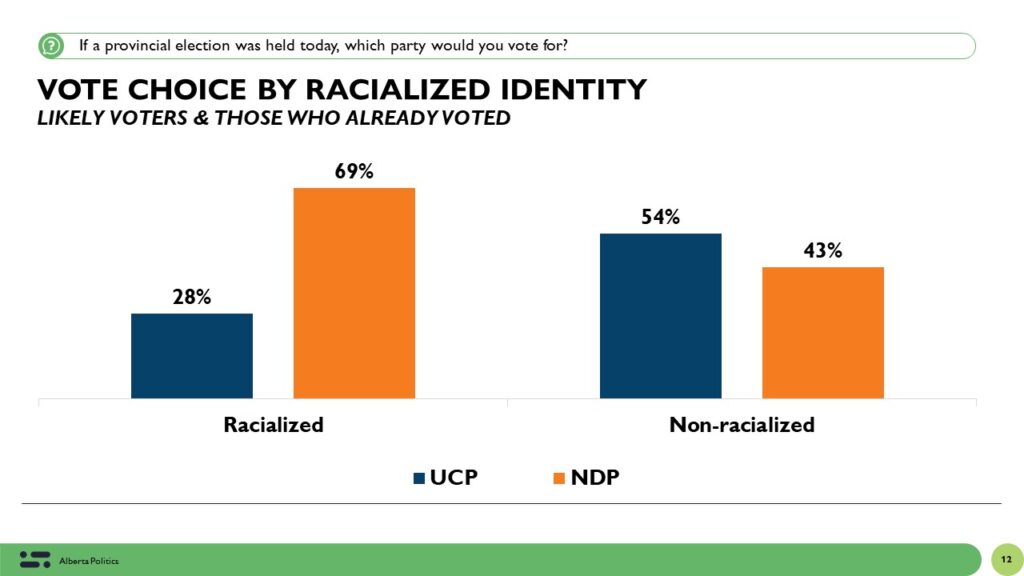
1 in 4 of those who voted for the federal Conservatives say they will vote or have voted for the NDP. Almost all of those who voted NDP or Liberal federally support the NDP.
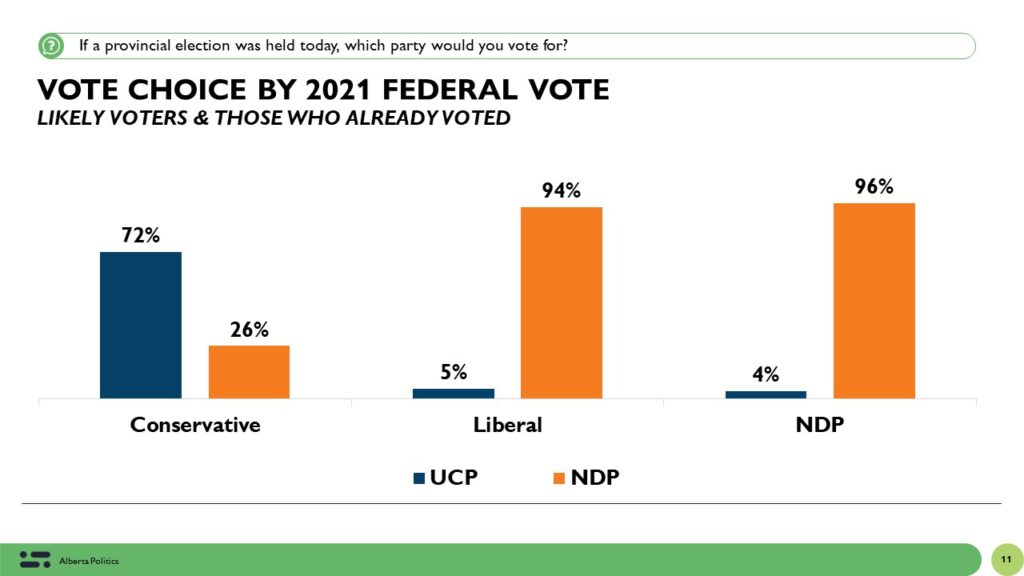
Overall, these results point to some very sharp divides in vote by demographic and regional variables. But it’s the UCP lead in Calgary (even if it ends up smaller than our estimate suggests) and among older voters that leads to my conclusion that they are the favourites to win the election outright tomorrow.
What explains this likely outcome?
35% of voters or likely voters feel the province is headed in the right direction. 47% feel it is off on the wrong track. For comparison, 31% of Canadians feel the country is headed in the right direction according to the most recent Abacus Data national survey.
Danielle Smith and Rachel Notley have almost identical personal images. 39% have a positive impression of Danielle Smith compared with 41% who feel the same way about Rachel Notley. Those with a negative view of the leaders are the same at 43%.
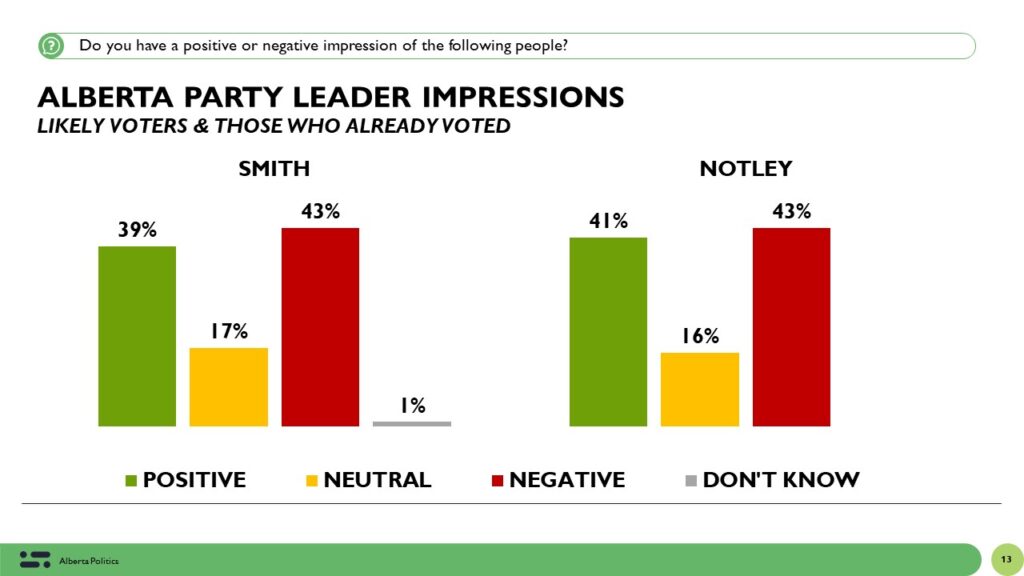
In Calgary proper, Smith’s net favourable rating is -3 while it’s -7 for Notley.
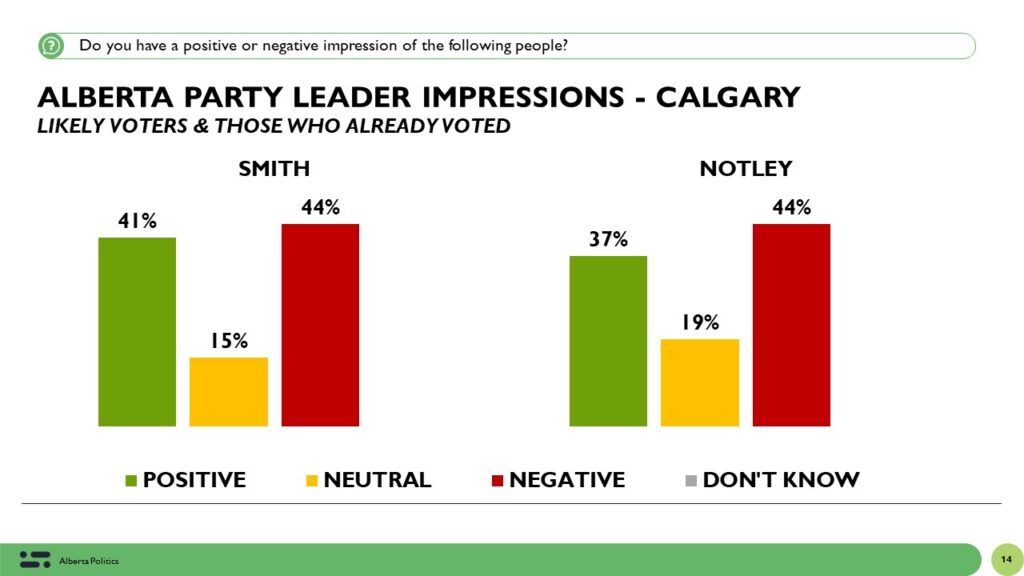
Results are also quite similar when it comes to the momentum of impressions. When asked whether their feelings about the two main leaders are getting better, worse, or not changing over the past few weeks, 32% say their impression of Smith is better while 34% say they are worse. For Notley, it is 30% better and 34% worse – almost exactly the same.
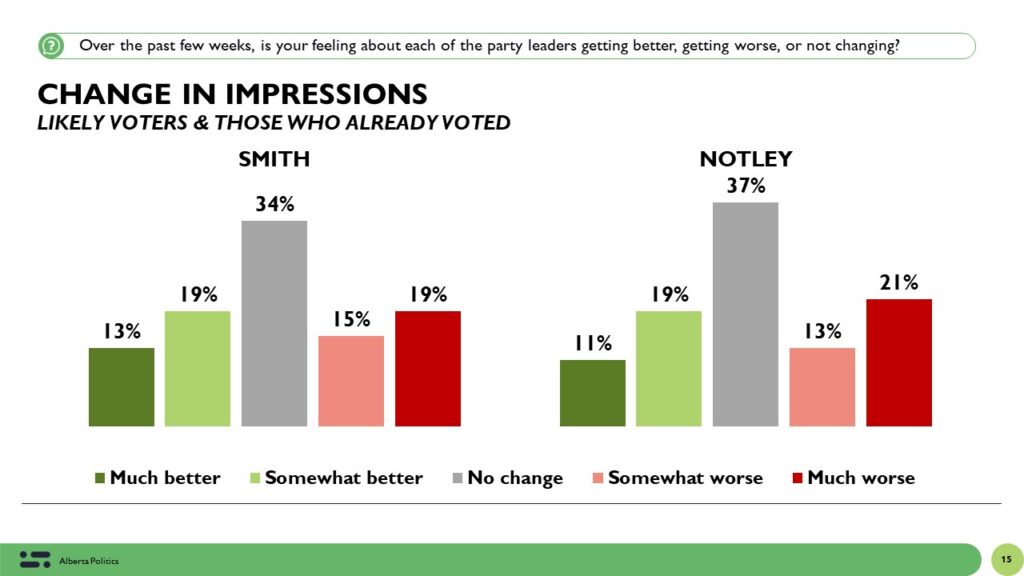
42% think Danielle Smith will be premier after the election double the number who feel Rachel Notley will be premier (21%). 37% are unsure who will be premier after the election.
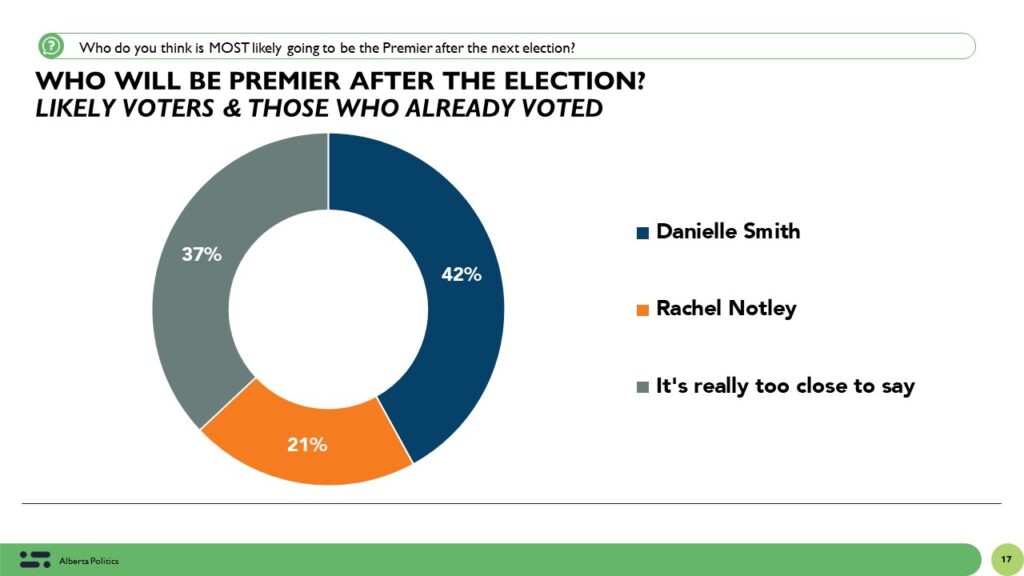
Both party campaigns have tried to frame this election in terms of risk. When Albertans are asked which choice is the riskiest, 51% select the UCP while 49% pick the NDP – an almost even split. The results are almost the exact same when framed around which party is a safe choice. 51% think the UCP is a safer choice while 49% select the NDP.
The UCP has a big lead on who Albertans think is best to manage the economy (59% to 41%), while the NDP leads on who people feel is most likely to fix healthcare (55% to 45%).
When it comes to values, 52% believe the UCP is closest to their own values, 4 points more than the NDP at 48%.
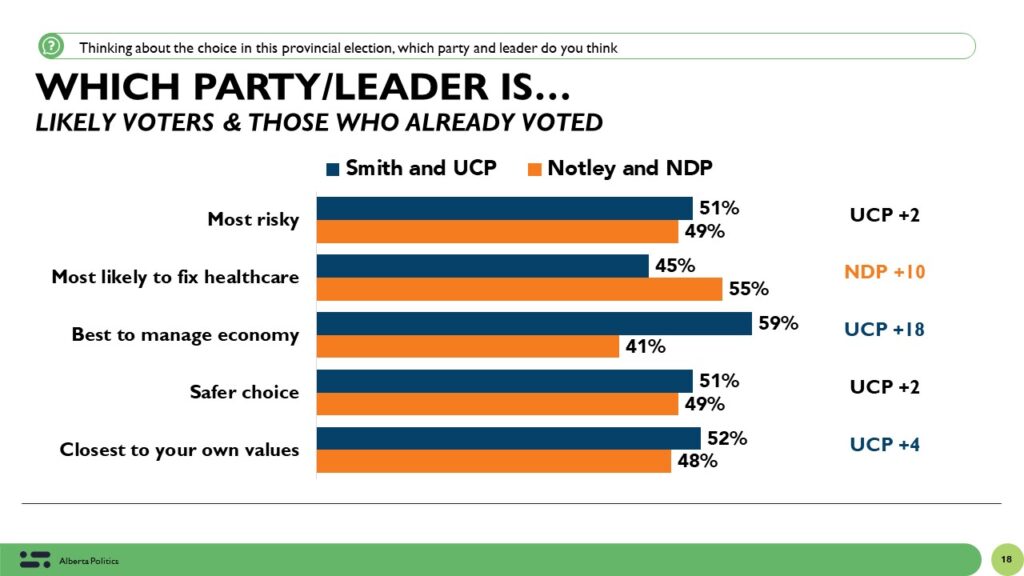
To evaluate the influence of Danielle Smith and the public’s perception of her on the election, I posed a question to respondents: how would their vote change if Smith was not leading the UCP?
The results indicate that Smith has made this election far closer than it would otherwise be. 44% of all eligible voters say they would vote UCP, 16 points more than would vote NDP at 28%. 5% would vote for the Alberta Party while 22% say they would be undecided.
Among those who have voted or are likely to vote, the UCP gets 55% to 38% for the NDP. In essence, Smith has likely depressed UCP support by 6 points when we compare these results to the actual vote or vote intention of these same people.
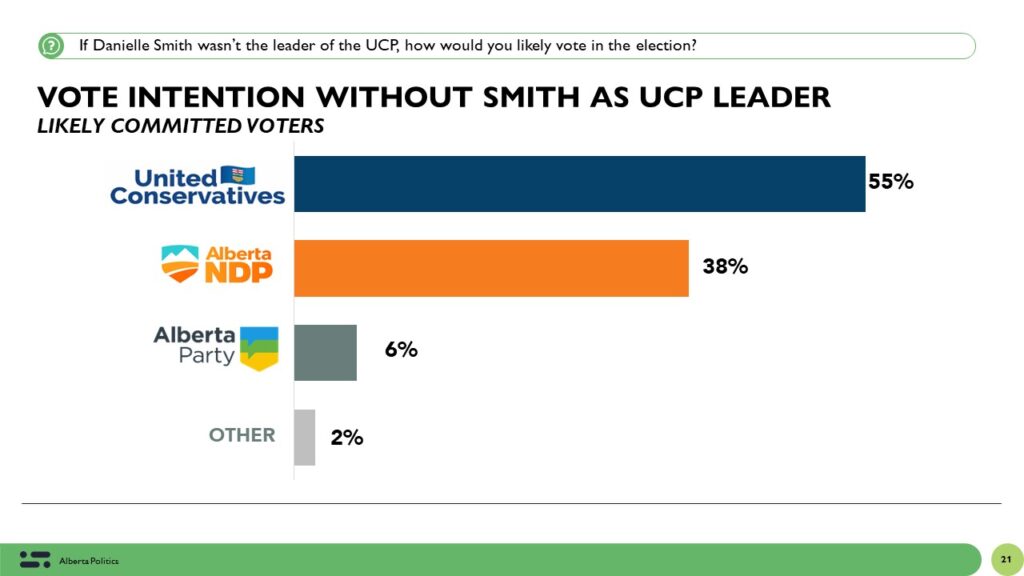
Finally, throughout the pre-election period and into the election, I’ve highlighted a group of respondents who I termed “Reluctant UCPers”. These are people who say they voted for the UCP in 2019 (when Jason Kenney won a big majority) but were either voting for another party or were undecided.
Today, that group represents only 10% of the electorate, an eight-point drop from the start of the campaign.
This suggests that the UCP campaign has been effective in convincing many of its past supporters who were on the fence to come home to the UCP while the NDP was unable to convert those Reluctant to vote UCP this time to switch.
Today, 14% of those who voted UCP in 2019 and either voted already or are likely to vote are voting NDP while 79% are voting UCP. 4% remain undecided. If that 4% all turn out tomorrow and vote NDP, that could have an impact – but the sample size is too small to give me any indication of how they might vote if they decide to cast a ballot tomorrow.
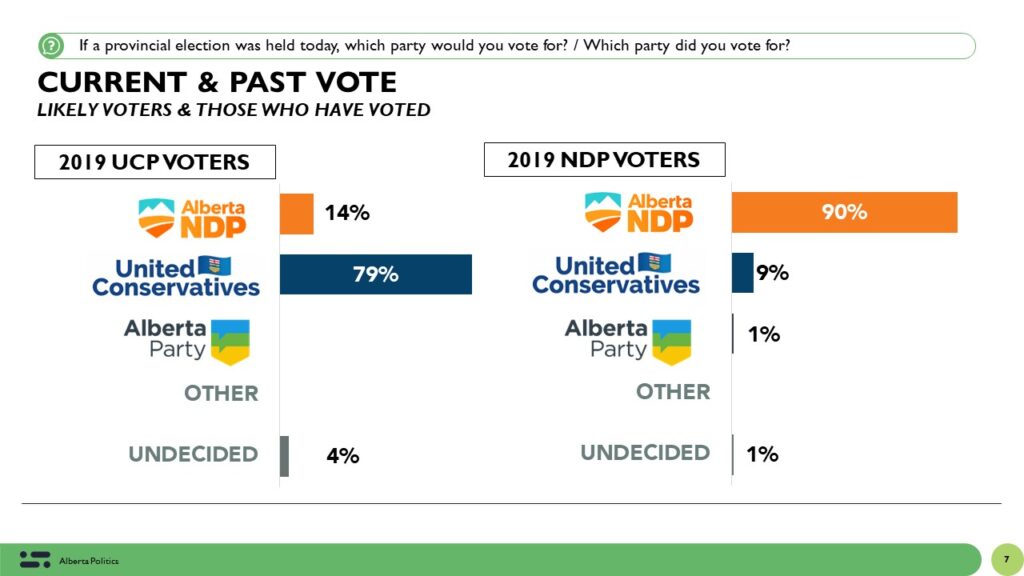
The Upshot
The NDP had to do something very difficult in this election. It had to convince a lot of Albertans to vote NDP for the first time in their lives. They had to get them to go against their identities and norms in the province to vote for a party they probably never thought they would. They convinced many, but it looks like not enough to win the election.
Coming into this election, Danielle Smith was very much the focus of people’s attention. Her favourables were lower than Rachel Notley’s. Many past UCP voters were repelled by her, thought she was worse than Jason Kenney as Premier, and felt she was a risky prospect. It looked like she would have a hard time either consolidating UCP support or motivating enough to support her.
In the end, the structural advantages of a united conservative electorate t in Alberta meant the UCP was always the favourites to win the election. The NDP needed to center the election around healthcare, convince voters they had economic credibility, and persuade individuals that Notley represented the safer option available.
Ultimately, it appears the NDP was unable to convince enough Albertans that the UCP and Smith were too risky and that Notley and the NDP were a safe alternative. To defeat an incumbent, especially in a province like Alberta, requires both those conditions to be met.
Danielle Smith will likely continue as Premier after tomorrow’s election. How long she can stay in the role remains to be seen. But her campaign closed stronger than it started with a solid debate performance and a closing week without much controversy.
Does this mean Alberta is now solidly a two-party system? I think so. Will it always be naturally competitive? Maybe not. Depends on many variables.
But whether or not the result tomorrow night is as I expect (and we still could be surprised), there will be a lot of lessons for political managers to unpack in the days and weeks ahead.
Alberta will come out of this election quite divided along regional, demographic, and cultural lines. This election exposed some big cleavages with old, traditional Alberta one on side and a newer, contemporary Alberta on the other. Younger and newer Albertans are strongly backing the NDP. Older and long-time residents of the province are backing the UCP. The UCP caucus will likely have few urban MLAs and will be dominated by elected members from smaller and rural communities. Governing in such an environment may prove both difficult and divisive.
Tomorrow we are likely to see Danielle Smith and the UCP re-elected but the results of the survey suggest we could be surprised. Some will think I’m hedging my bets but any conclusion otherwise would be foolish given how close things are and the variables that polling can’t capture. indicate that close enough that I may
Subscribe to my substack for more data and breakouts in the coming days from this poll.
METHODOLOGY
The survey was conducted with 1,200 Alberta adults eligible to vote from May 26 to 28, 2023.
A random sample of panelists were invited to complete the survey from a set of partner panels based on the Lucid exchange platform. These partners are typically double opt-in survey panels, blended to manage out potential skews in the data from a single source.
The margin of error for a comparable probability-based random sample of the same size is +/- 2.9%, 19 times out of 20.
The data were weighted according to census data to ensure that the sample matched Alberta’s population according to age, gender, educational attainment, and region. Totals may not add up to 100 due to rounding.
This survey was paid for by Abacus Data Inc.
Abacus Data follows the CRIC Public Opinion Research Standards and Disclosure Requirements that can be found here: https://canadianresearchinsightscouncil.ca/standards/
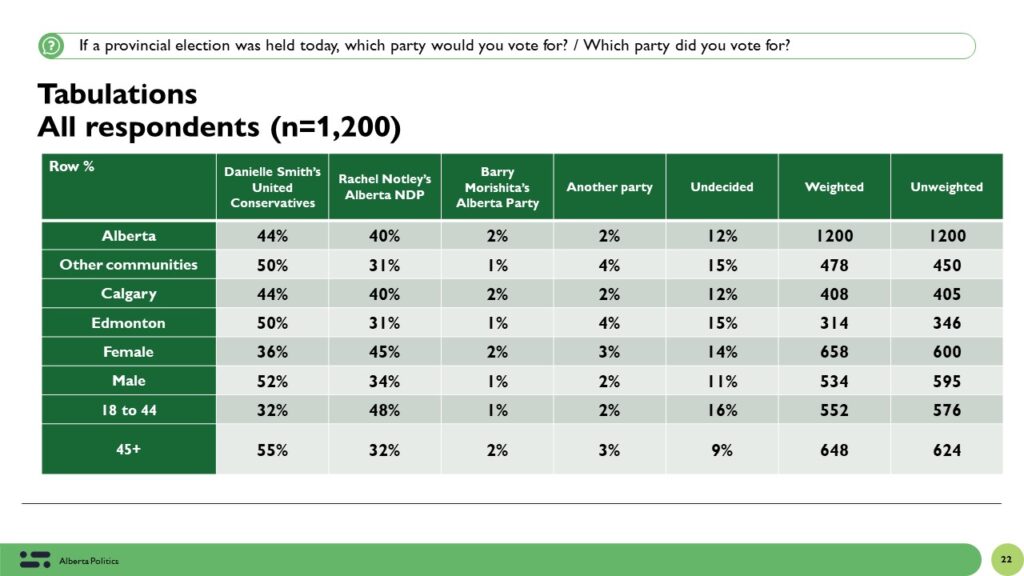
ABOUT DAVID COLETTO
David Coletto is Chair, CEO and a founding partner of Abacus Data a full-service market research and strategy firm based in Ottawa and Toronto. With over a decade and a half of experience in the industry, David and his partners founded Abacus 12 years ago and since then David has become one of Canada’s most respected social researchers regularly commenting on politics, the labour market, and consumer behaviour.
He earned a PhD in Political Science from the University of Calgary in 2010 and is an adjunct professor at Carleton University. He is the host and producer of inFocus with David Coletto a podcast that explores the intersection of public opinion, politics, public policy, and consumer behaviour.
ABOUT ABACUS DATA
We are the only research and strategy firm that helps organizations respond to the disruptive risks and opportunities in a world where demographics and technology are changing more quickly than ever.
We are an innovative, fast-growing public opinion and marketing research consultancy. We use the latest technology, sound science, and deep experience to generate top-flight research-based advice to our clients. We offer global research capacity with a strong focus on customer service, attention to detail, and exceptional value.
We were one of the most accurate pollsters conducting research during the 2021 Canadian election following up on our outstanding record in 2019.
Contact us with any questions.
Find out more about how we can help your organization by downloading our corporate profile and service offering.